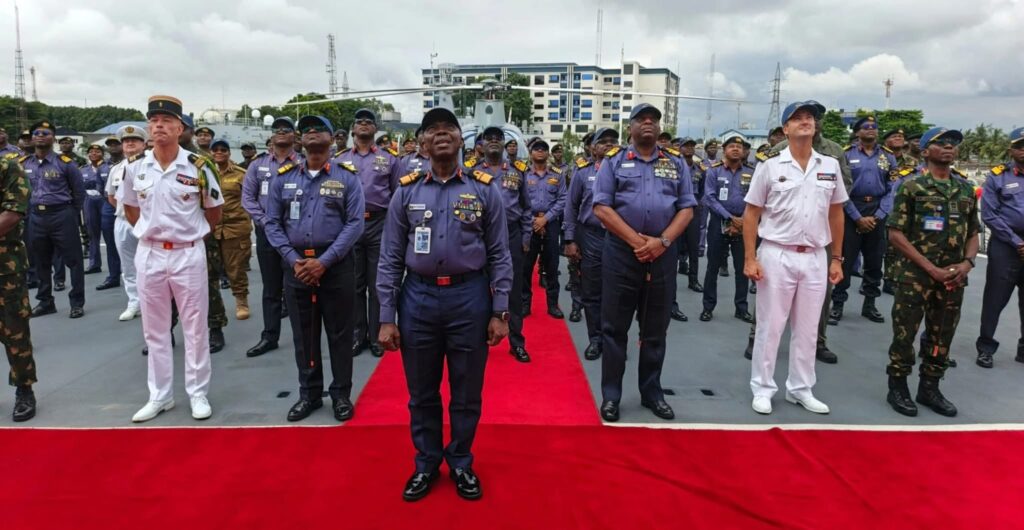A criminal gang kidnapped 16 merchant vessel crew members in the Gulf of Guinea and held them near the beach at Takwa Bay, Nigeria. Nigerian Navy Special Boat Service commandos scoped the kidnappers’ hideout, then entered.
Soon, shots rang out.
“Drop your weapons!” a Nigerian Sailor shouted three times. “Get down!”
In moments, commandos rescued the crew and dismantled the hijackers’ camp. The complex, simulated rescue was part of Crocodile Lift 2025, a joint maritime security exercise held with the French Navy at Naval Base Apapa in Lagos. The four-day anti-piracy exercise ended October 10.
France deployed a Mistral-class helicopter carrier with landing craft, troops and supplies. A French 21,500-ton amphibious assault ship served as a command center.
Throughout Crocodile Lift, the Nigerian Navy contributed five warships, a tank designed for amphibious beach landings, an offshore patrol vessel and two helicopters. The exercise included tactical beach landings, helicopter rappelling drills and medical evacuation procedures. It aimed to build the navies’ capabilities to deter piracy, sea robberies, oil theft, human trafficking and illegal fishing.
Nigerian Navy Rear Adm. Ifeanyi Okpala said Crocodile Lift highlights the Navy’s willingness to work closely with international partners to maintain maritime security.
“This exercise not only strengthens our operational capabilities but also reinforces our commitment to securing the maritime environment in partnership with international allies,” Okpala said in a report by Nigerian news site This Day Live. “It’s a crucial step in improving our interoperability, particularly in dealing with the complex threats in the Gulf of Guinea.”
French Landing Group commander, Col. Benjamin Brunet, described the exercise as a practical way to test advanced operational equipment in real maritime conditions.
“It’s a great opportunity to train together, deploy new vehicles, and enhance cooperation with a powerful partner like Nigeria,” Brunet said in the This Day Live report. “This exercise reflects strong coordination between the navy and army, and shows our shared commitment to peace and security in the Gulf of Guinea.”
Nigerian Navy Rear Adm. Monday Unrhiere said the annual exercise strengthens the Navy’s capacity to conduct amphibious landings and combat operations while benefiting from inter-agency cooperation.
“You will recall that the International Maritime Bureau in 2022 delisted Nigeria from the list of piracy-prone nations,” Unrhiere said in a report by Nigeria’s Channels Television. “I’m glad to say that, three years on, the Nigerian Navy has maintained zero piracy incidents to date.”
The Nigerian Maritime Administration and Safety Agency (NIMASA), which works to reinforce civil-military cooperation in maritime governance, also participated in the exercise. Arsenio Domínguez, secretary-general of the International Maritime Organization (IMO), was in Lagos days before Crocodile Lift 2025 began and lauded NIMASA’s Deep Blue Project for helping reduce piracy within Nigeria’s waters and the Gulf of Guinea.
“The Deep Blue Project continues to stand out as a major achievement, significantly improving maritime domain awareness and contributing to a safer and more secure Gulf of Guinea,” Dominguez wrote in an October 10 letter to NIMASA. “I encourage NIMASA to maintain its focus on the long-term sustainability of the project so it may serve as a model for broader regional security frameworks.”

